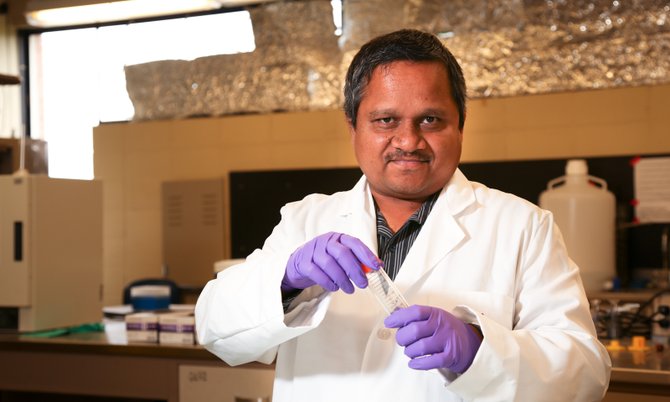Jackson State University professor and researcher Dr. Paresh Ray recently became one of 30 people worldwide to receive the 2014 Mahatma Gandhi Pravasi Samman Award for his research and contributions to cancer research in the fields of nanoscience and nanotechnology.
The Non-Resident Indians Welfare Society of India and Indian government officials will present Ray with the award May 7 in New Delhi, India.
"I'm really happy to be honored," Ray said. "The award is well-known in India."
The Ministry of Overseas Indian Affairs and the Union of India give the award each year to recognize outstanding service, contributions and achievements of Indian-born professionals living and working outside of India.
Ray has been working with a research team at the Jackson State University Center for Nanoscience and Nanotechnology to develop a photothermal therapy system that kills cancer cells without harming healthy cells. This will provide a way for cancer patients to undergo treatment without the harsh side effects of chemotherapy and radiation.
Ray's new therapy system has been effective in lab tests, killing prostate, breast, skin and liver cancer cells.
The photothermal therapy system works by using popcorn-sized nanoparticles to detect and kill cancer cells, and to monitor the efficiency of the treatment. A patent is currently pending for the system.
The professor's team is also the first to use gold nanoparticles to target and kill the multidrug-resistant salmonella bacteria, DT 104. This development fulfills the need for a faster way to detect salmonella.
Ray presented his research at the 243rd National Meeting and Exposition of the American Chemical Society, the world's largest scientific society, in March 2012.
The internationally known chemist has written 132 research papers that members of the scientific community have cited more than 40 times. His "Selective detection of mercury (II) ion using nonlinear optical properties of gold nanoparticles," which the Journal of the American Chemical Society published in 2008, has 175 citations.
Ray's career goal as a professor and researcher is to continue the development of new scientific concepts and technologies. This includes the exploration of new chemical strategies for the imaging and therapy of cancer cells; multidrug-resistant bacteria; new nano-based sensors for different chemical and biological toxins; multifunctional nanomaterial for multimodal imaging; and biomolecular interaction with nanosurface.



Comments